
Pongamia Pinnata
Jatropha
Mission
Feasibility Study
Lectures
Lamp Oil
Plant
Germination
Drip Irrigation
Soil Test
Pre-Plantation
Plantation
Post-Plantation
Large Plantation
Why Jatropha?
Economics
Oil Yield
Training
eBook
View Point
Contract Farming
NGO Model
Analysis
Photos
C D M
Bio ATF
Tour
Insurance


F A Q
Consultancy
Veg Oils
BioDiesel
Algae
Herbal Product
Climate Adaptation
Contact Me
My Resume
 |
Satish Lele lelejatropha@gmail.com |

Traditional Indian Jatropha Oil Lamp |
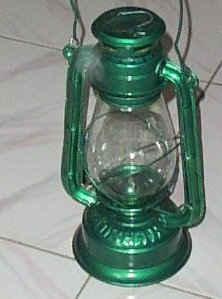
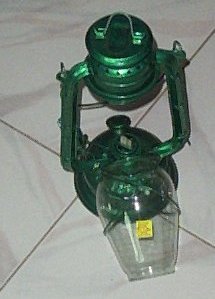 |
When you burn Jatropha oil in a lamp, a fine soot is emitted. Actually this soot is Activated Carbon, which adsorbs poisonous materials from air, cleans the air, and reduces Respiratory problems. In most parts of India, the lighting of lamp at night is a normal practice. Also there is no Electric Power Supply for 4 to 14 hours a day in rural India. In light of this and ever worsening scenario, Traditional Indian Jatropha Oil Lamp and Lantern are the only Hope of Light for Rural India. Though the lumen output efficiency of these is 10 to 20% less than that of Electric Lamps, these are simple and economic. These can spread light in the life of people in rural areas. Use of the Crude Jatropha Oil as fuel for these lamps is more pressing than the use of Jatropha oil for manufacture of BioDiesel, as diesel is easily available. Farmers can grow the jatropha trees on fence and extract oil from seeds locally, using hand operated expellers, and they can use Jatropha oil locally.
If the people in the village plant Jatropha on 10 acres of fallow land, they can get at least 2 tons of Jatropha seeds (500 liters of Jatropha oil) after 1 year, 5 tons of Jatropha seeds (1,250 liters of Jatropha oil) after 2 years and 10 tons of Jatropha seeds (2,500 liters of Jatropha oil) every year after 3 years. This can satisfy the needs of liquid fuel for Lighting and Cooking. (Jatropha oil, expelled from seeds using hand operated oil expellers, can replace Kerosene or Lamp oil in these two applications and oil can be used in small low RPM Engines shown below). A village can become self-sufficient in its energy needs.
Initially, most of the oil will be used in small engines and for lighting in Traditional Indian Oil Lamps and Lanterns since it will be easier for farmer to process the seeds locally, and he can get better value for his produce locally. Jatropha oil will also be used in big Diesel Engine based Electricity Generating sets, Pump Sets, Heavy Farm Machinery, where the viscosity of oil is not an issue. The requirement for this sector is 20 to 25 million tons per year.
Procedure for Plantation : Start production of Jatropha Saplings 3 months before onset of monsoon. Dig pits on fallow land in 3 m x 2 m formation. Plant these saplings on onset of monsoon. During rainy season, Jatropha will grow well with rain water. During hot summer months, carry water in bullock cart tanks, and provide 3 to 5 liters of water to each plant once a week.
Plantation of Jatropha alone is not economically attractive, as there is little income from Jatropha oil for first 2 to 3 years. As Jatropha plant is initially small in height, Castor is intercropped with Jatropha in Fallow Land, to get income and oil for first 2 to 3 years. This oil can be used for Lighting homes. (see Castor). If land is good, soy can be grown, as soy oil is edible oil and soy meal is cattle feed and Jatropha can provide higher income.



Raw Jatropha oil can be used as it is in stoves for cooking purposes. The first is pressure stove, which emits oil into burner under air pressure, second is Wick stove, where oil rises to burner by capillary action while third is fed with fuel under gravity force of oil in side bottle.
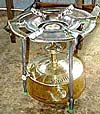
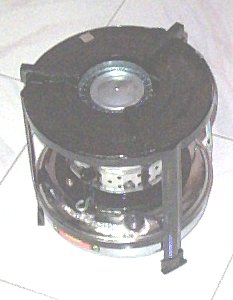
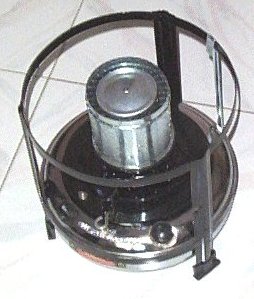
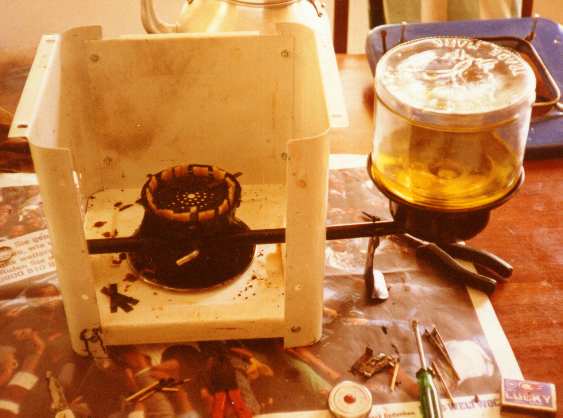
Gravity Stove
Lister type engines are produced in India. One of them is "Fieldmarshal" engine, manufactured by P.M. Diesels Ltd, Aji Industrial Estate, P.O.Box 1003, Rajkot, 360 003, India. Tel : 91-281-2387401-2-3-4 Fax : 91-281-2387406, Web Site : www.fieldmarshal.com.

 Jatropha Plant
Jatropha Plant